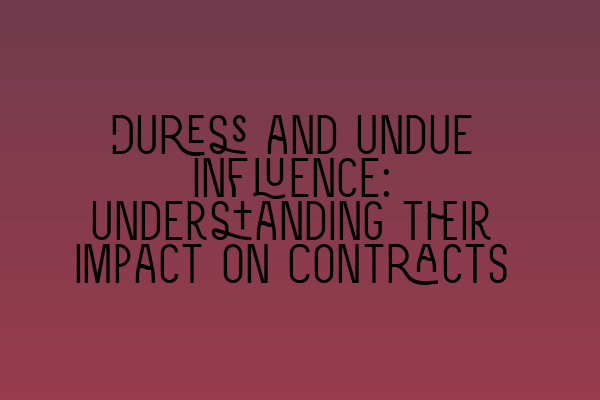Duress and Undue Influence: Understanding their Impact on Contracts
When it comes to contract law, there are several important principles that must be understood in order to determine the validity and enforceability of a contract. Two such principles are duress and undue influence. These concepts play a significant role in contract negotiations and can have a major impact on the outcome of a contractual agreement.
Duress refers to a situation where one party to a contract is forced or coerced into entering into the agreement against their will. This can take various forms, such as physical violence, threats, or blackmail. In order for duress to invalidate a contract, it must be shown that the threatened party had no reasonable alternative but to enter into the contract under duress.
Undue influence, on the other hand, occurs when one party exerts excessive influence over another party, causing them to enter into a contract against their own better judgment. Unlike duress, undue influence does not require coercion or threats. It can be subtle and may involve manipulation, taking advantage of a vulnerable party, or exploiting a position of trust and power.
So, why are duress and undue influence important when it comes to contracts? The answer lies in the fundamental principle of contract law: the need for free and voluntary consent of all parties involved. A contract is fundamentally an agreement between parties, and for it to be valid, the consent must be given freely and without any external pressures.
If duress or undue influence is proven, it can render the contract voidable, allowing the affected party to potentially rescind or set aside the contract. This serves to protect individuals from unfair or unjust agreements and ensures that contracts are entered into willingly and with full understanding of the consequences.
To demonstrate the impact of duress and undue influence on contracts, let’s consider a hypothetical example. Imagine a wealthy individual taking advantage of a financially struggling person by offering them a loan at an exorbitant interest rate. The financially struggling individual may feel compelled to accept the loan due to their dire circumstances, even though it is clearly to their disadvantage. This scenario would likely raise concerns of undue influence and could potentially render the contract invalid.
It is crucial to understand the signs and indicators of duress and undue influence in contract negotiations. This awareness can help individuals recognize when their rights may be compromised or when they may have a valid claim to void a contract due to these factors.
In conclusion, duress and undue influence are essential concepts in contract law. They highlight the importance of free and voluntary consent in contractual agreements. When reviewing or entering into a contract, it is vital to be aware of any signs of duress or undue influence. If you suspect that either of these factors may be present, seeking legal advice is recommended to navigate the complexities of contract law and protect your rights.
For more information on contract law and preparing for the SQE exams, check out these related articles:
– SQE 1 Practice Exam Questions
– SQE 1 Practice Mocks FLK1 FLK2
– SQE 2 Preparation Courses
– SQE 1 Preparation Courses
– SRA SQE Exam Dates
Understanding the impact of duress and undue influence on contracts is essential for all individuals involved in contract negotiations or seeking legal redress. By staying informed and vigilant, you can protect yourself from unfair agreements and ensure that your contractual obligations are entered into freely and voluntarily.
